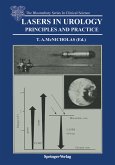Prostate Cancer: A Comprehensive Perspective
Herausgegeben:Tewari, Ashutosh
Prostate Cancer: A Comprehensive Perspective
Herausgegeben:Tewari, Ashutosh
- Broschiertes Buch
- Merkliste
- Auf die Merkliste
- Bewerten Bewerten
- Teilen
- Produkt teilen
- Produkterinnerung
- Produkterinnerung
Prostate cancer is the commonest male cancer with over 5 million survivors in US alone. Worldwide, the problem is staggering and has attracted significant attention by media, scientists and cancer experts.
Significant research, discoveries, innovations and advances in treatment of this cancer have produced voluminous literature which is difficult to synthesize and assimilate by the medical community. Prostate Cancer: A Comprehensive Perspective is a comprehensive and definitive source which neatly resolves this problem. It covers relevant literature by leading experts in basic science,…mehr
Andere Kunden interessierten sich auch für
![Prostate Cancer Prevention Prostate Cancer Prevention]() Prostate Cancer Prevention69,99 €
Prostate Cancer Prevention69,99 €![Prostate Cancer Screening Prostate Cancer Screening]() Prostate Cancer Screening177,99 €
Prostate Cancer Screening177,99 €![Laparoscopic and Robot-Assisted Surgery in Urology Laparoscopic and Robot-Assisted Surgery in Urology]() Laparoscopic and Robot-Assisted Surgery in Urology133,99 €
Laparoscopic and Robot-Assisted Surgery in Urology133,99 €![Tumours in Urology Tumours in Urology]() Tumours in Urology41,99 €
Tumours in Urology41,99 €![Management of Urological Cancers in Older People Management of Urological Cancers in Older People]() Management of Urological Cancers in Older People168,99 €
Management of Urological Cancers in Older People168,99 €![Lasers in Urology Lasers in Urology]() Lasers in Urology42,99 €
Lasers in Urology42,99 €![Prostate Cancer Survivorship Prostate Cancer Survivorship]() Sanchia S. GoonewardeneProstate Cancer Survivorship81,99 €
Sanchia S. GoonewardeneProstate Cancer Survivorship81,99 €-
-
-
Prostate cancer is the commonest male cancer with over 5 million survivors in US alone. Worldwide, the problem is staggering and has attracted significant attention by media, scientists and cancer experts.
Significant research, discoveries, innovations and advances in treatment of this cancer have produced voluminous literature which is difficult to synthesize and assimilate by the medical community. Prostate Cancer: A Comprehensive Perspective is a comprehensive and definitive source which neatly resolves this problem. It covers relevant literature by leading experts in basic science, molecular biology, epidemiology, cancer prevention, cellular imaging, staging, treatment, targeted therapeutics and innovative technologies.
Prostate Cancer: A Comprehensive Perspective, is a valuable and timely resource for urologists and oncologists.
Hinweis: Dieser Artikel kann nur an eine deutsche Lieferadresse ausgeliefert werden.
Significant research, discoveries, innovations and advances in treatment of this cancer have produced voluminous literature which is difficult to synthesize and assimilate by the medical community. Prostate Cancer: A Comprehensive Perspective is a comprehensive and definitive source which neatly resolves this problem. It covers relevant literature by leading experts in basic science, molecular biology, epidemiology, cancer prevention, cellular imaging, staging, treatment, targeted therapeutics and innovative technologies.
Prostate Cancer: A Comprehensive Perspective, is a valuable and timely resource for urologists and oncologists.
Hinweis: Dieser Artikel kann nur an eine deutsche Lieferadresse ausgeliefert werden.
Produktdetails
- Produktdetails
- Verlag: Springer / Springer London / Springer, Berlin
- Artikelnr. des Verlages: 978-1-4471-6975-8
- Softcover reprint of the original 1st ed. 2013
- Seitenzahl: 1144
- Erscheinungstermin: 30. September 2016
- Englisch
- Abmessung: 279mm x 210mm x 57mm
- Gewicht: 2350g
- ISBN-13: 9781447169758
- ISBN-10: 1447169751
- Artikelnr.: 45509560
- Herstellerkennzeichnung Die Herstellerinformationen sind derzeit nicht verfügbar.
- Verlag: Springer / Springer London / Springer, Berlin
- Artikelnr. des Verlages: 978-1-4471-6975-8
- Softcover reprint of the original 1st ed. 2013
- Seitenzahl: 1144
- Erscheinungstermin: 30. September 2016
- Englisch
- Abmessung: 279mm x 210mm x 57mm
- Gewicht: 2350g
- ISBN-13: 9781447169758
- ISBN-10: 1447169751
- Artikelnr.: 45509560
- Herstellerkennzeichnung Die Herstellerinformationen sind derzeit nicht verfügbar.
Section 1: Basic Scientific Foundation.- 1. Development, Applied and Surgical Anatomy of the Prostate.- 2. Molecular Biology and Prostate Cancer.- 3. Endocrine Mechanisms, Androgen Receptor and Carcinogenesis, Hormone Escape.- 4. Molecular Mechanisms of Castrate Resistant Prostate Cancer.- 5. Immunologic Aspects of Prostate Cancer.- 6. Stem Cells in Carcinogenesis of the Prostate.- 7. Murine Models of Prostate Cancer.- 8. Prostate Cancer and the Metabolic Syndrome.- 9. Inflammation and Cancer of the Prostate.- 10. HIV and Prostate Cancer.- 11. Prostate Cancer Genetics.- 12. Gene Expression Profiling and Somatic Genome Changes.- 13. The Proteomic Approach to Prostate Cancer.- 14. Epigenetic Changes in Prostate Cancer.- 15. Biomarkers of Potential Therapeutic Value.- 16. Prostate Tissue Banking.- 17. Molecular Imaging in Diagnostics.- 18. Molecular Risk Profiling.- 19. Premalignant Lesions of the Prostate.- 20. The Pathology of Prostatic Carcinoma.- 21. The Pathology of Non-Epithelial Tumors of the Prostate.- 22. Neuroendocrine Prostate Cancer.- Section 2: Epidemiology, Screening, and Chemoprevention.- 23. Epidemiology of Prostate Cancer.- 24. Racial Disparities and the Global Picture.- 25. Natural History of Prostate Cancer.- 26. Population-Based Health Systems as a Foundation for Prostate Cancer Control Research: The Cancer Research Network.- 27. Screening for Prostate Cancer.- 28. Next Generation Screening Tests.- 29. Diet and Prostate Cancer: A Holistic Approach to Management.- 30. Estrogens in Prostate Cancer.- 31. Vitamin D and Prostate Cancer.- 32. The Role of 5a-Reductase Inhibitors (5-ARIs) in Prostate Cancer Chemoprevention.- 33. Other Pharmaceutical Agents in the Chemoprevention of Prostate Cancer.- Section 3: Diagnosis and Staging.- 34. Early-Detection and Patient Risk Stratification in Prostate Cancer.- 35. Tumor Markers.- 36. Prostate Specific Membrane Antigen-Based Diagnostics.- 37. Prostate Specific Membrane Antigen-Based Therapeutics.- 38. Presentation and Symptomatology of Prostate Cancer.- 39. The Role of Ultrasonography.- 40. The Use of Magnetic Resonance Imaging in the Management of Prostate Cancer.- 41. The Role of Functional Magnetic Resonance Imaging Techniques.- 42. Prostate Biopsy.- 43. The Staging of Prostate Cancer.- 44. Nuclear Medicine in Prostate Cancer.- 45. Nanotechnology and Prostate Cancer.- Section 4: Risk Assessment and Decision-Making Strategies for Localized Prostate Cancer.- 46. Disease Risk Stratification.- 47. Nomograms in Prostate Cancer.- 48. Comparative Effectiveness of Treatment Alternatives for Localized Prostate Cancer.- Section 5: Management of Localized Disease.- 49. Radical Treatment for Localized Disease: An Overview of Options and Strategies for Decision Making.- 50. Quality of Life and Management of Localized Disease.- 51. Active Surveillance for Favorable-Risk Prostate Cancer.- 52. Anesthesia for Robotic-Assisted Prostatectomy.- 53. Retropubic Radical Prostatectomy: The Technique.- 54. Retropubic Radical Prostatectomy: The Results.- 55. Radical Perineal Prostatectomy.- 56. Laparoscopic Radical Prostatectomy: The Technique.- 57. Laparoscopic Radical Prostatectomy: The Results.- 58. Robotic Assisted Radical Prostatectomy: The Technique.- 59. Lymph Node Dissection in Prostate Cancer Surgery.- 60. External Beam Radiotherapy for Low Risk Prostate Cancer.- 61. Prostate Brachytherapy: Low Dose Rate.- 62. Prostate Brachytherapy: High Dose Rate.- 63. Intensity Modulated Radiotherapy.- 64. Proton Beam Therapy and Novel Radiotherapeutic Approaches to the Treatment of Prostate Cancer.- 65. Prostate Cryotherapy.- 66. Focal Therapies for Localized Prostate Cancer.- Section 6: Failure and Management of Recurrent, Locally Advanced, and Advanced Disease.- 67. Biochemical Failure in Prostate Cancer.- 68. The Phenomenon of PSA Bounce After Radiation Therapy.- 69. Management of Locally Recurrent Disease.- 70. Management of High Risk/Locally Advanced Disease.- 71. Radiotherapy Plus Hormonal Therapy.- 72. Watchful Waiting in Advanced Prostate Cancer.- 73. Androgen and Androgen Receptor Directed Therapy as Initial Treatment for Prostate Cancer.- 74. Hormone-Based Therapies for Castration Resistant Prostate Cancer.- 75. Toxicity of Androgen Deprivation Therapy in Hormone Sensitive Prostate Cancer.- 76. Chemotherapy and Novel Systemic Approaches in the Treatment of Metastatic Castration Resistant Prostate Cancer.- 77. Immunotherapy.- 78. Bone Health: Prevention of Skeletal Related Events and Palliative Care.- Section 7: Outcomes and Complications After Treatment.- 79. Assessment of Treatment Outcomes Following Prostate Cancer Therapy.- 80. Urinary Incontinence.- 81. Erectile Dysfunction.- 82. Immediate/Early Surgical Complications.- 83. Population-Based Outcomes Following Treatment of Clinically-Localized Prostate Cancer.- 84. Management of Radiation Adverse Effects.- 85. Management of Complications Following Minimally Invasive Prostate Cancer Therapy.- Section 8: Management of Emergencies and Palliative Care.- 86. Prostate Cancer Emergencies.- 87. Management of Bone Metastases.- 88. Pain Relief in Metastatic Cancer.- 89. The Psycho-Social Impact of Prostate Cancer.- 90. Nursing Issues in Prostate Cancer.
Section 1: Basic Scientific Foundation.- 1. Development, Applied and Surgical Anatomy of the Prostate.- 2. Molecular Biology and Prostate Cancer.- 3. Endocrine Mechanisms, Androgen Receptor and Carcinogenesis, Hormone Escape.- 4. Molecular Mechanisms of Castrate Resistant Prostate Cancer.- 5. Immunologic Aspects of Prostate Cancer.- 6. Stem Cells in Carcinogenesis of the Prostate.- 7. Murine Models of Prostate Cancer.- 8. Prostate Cancer and the Metabolic Syndrome.- 9. Inflammation and Cancer of the Prostate.- 10. HIV and Prostate Cancer.- 11. Prostate Cancer Genetics.- 12. Gene Expression Profiling and Somatic Genome Changes.- 13. The Proteomic Approach to Prostate Cancer.- 14. Epigenetic Changes in Prostate Cancer.- 15. Biomarkers of Potential Therapeutic Value.- 16. Prostate Tissue Banking.- 17. Molecular Imaging in Diagnostics.- 18. Molecular Risk Profiling.- 19. Premalignant Lesions of the Prostate.- 20. The Pathology of Prostatic Carcinoma.- 21. The Pathology of Non-Epithelial Tumors of the Prostate.- 22. Neuroendocrine Prostate Cancer.- Section 2: Epidemiology, Screening, and Chemoprevention.- 23. Epidemiology of Prostate Cancer.- 24. Racial Disparities and the Global Picture.- 25. Natural History of Prostate Cancer.- 26. Population-Based Health Systems as a Foundation for Prostate Cancer Control Research: The Cancer Research Network.- 27. Screening for Prostate Cancer.- 28. Next Generation Screening Tests.- 29. Diet and Prostate Cancer: A Holistic Approach to Management.- 30. Estrogens in Prostate Cancer.- 31. Vitamin D and Prostate Cancer.- 32. The Role of 5a-Reductase Inhibitors (5-ARIs) in Prostate Cancer Chemoprevention.- 33. Other Pharmaceutical Agents in the Chemoprevention of Prostate Cancer.- Section 3: Diagnosis and Staging.- 34. Early-Detection and Patient Risk Stratification in Prostate Cancer.- 35. Tumor Markers.- 36. Prostate Specific Membrane Antigen-Based Diagnostics.- 37. Prostate Specific Membrane Antigen-Based Therapeutics.- 38. Presentation and Symptomatology of Prostate Cancer.- 39. The Role of Ultrasonography.- 40. The Use of Magnetic Resonance Imaging in the Management of Prostate Cancer.- 41. The Role of Functional Magnetic Resonance Imaging Techniques.- 42. Prostate Biopsy.- 43. The Staging of Prostate Cancer.- 44. Nuclear Medicine in Prostate Cancer.- 45. Nanotechnology and Prostate Cancer.- Section 4: Risk Assessment and Decision-Making Strategies for Localized Prostate Cancer.- 46. Disease Risk Stratification.- 47. Nomograms in Prostate Cancer.- 48. Comparative Effectiveness of Treatment Alternatives for Localized Prostate Cancer.- Section 5: Management of Localized Disease.- 49. Radical Treatment for Localized Disease: An Overview of Options and Strategies for Decision Making.- 50. Quality of Life and Management of Localized Disease.- 51. Active Surveillance for Favorable-Risk Prostate Cancer.- 52. Anesthesia for Robotic-Assisted Prostatectomy.- 53. Retropubic Radical Prostatectomy: The Technique.- 54. Retropubic Radical Prostatectomy: The Results.- 55. Radical Perineal Prostatectomy.- 56. Laparoscopic Radical Prostatectomy: The Technique.- 57. Laparoscopic Radical Prostatectomy: The Results.- 58. Robotic Assisted Radical Prostatectomy: The Technique.- 59. Lymph Node Dissection in Prostate Cancer Surgery.- 60. External Beam Radiotherapy for Low Risk Prostate Cancer.- 61. Prostate Brachytherapy: Low Dose Rate.- 62. Prostate Brachytherapy: High Dose Rate.- 63. Intensity Modulated Radiotherapy.- 64. Proton Beam Therapy and Novel Radiotherapeutic Approaches to the Treatment of Prostate Cancer.- 65. Prostate Cryotherapy.- 66. Focal Therapies for Localized Prostate Cancer.- Section 6: Failure and Management of Recurrent, Locally Advanced, and Advanced Disease.- 67. Biochemical Failure in Prostate Cancer.- 68. The Phenomenon of PSA Bounce After Radiation Therapy.- 69. Management of Locally Recurrent Disease.- 70. Management of High Risk/Locally Advanced Disease.- 71. Radiotherapy Plus Hormonal Therapy.- 72. Watchful Waiting in Advanced Prostate Cancer.- 73. Androgen and Androgen Receptor Directed Therapy as Initial Treatment for Prostate Cancer.- 74. Hormone-Based Therapies for Castration Resistant Prostate Cancer.- 75. Toxicity of Androgen Deprivation Therapy in Hormone Sensitive Prostate Cancer.- 76. Chemotherapy and Novel Systemic Approaches in the Treatment of Metastatic Castration Resistant Prostate Cancer.- 77. Immunotherapy.- 78. Bone Health: Prevention of Skeletal Related Events and Palliative Care.- Section 7: Outcomes and Complications After Treatment.- 79. Assessment of Treatment Outcomes Following Prostate Cancer Therapy.- 80. Urinary Incontinence.- 81. Erectile Dysfunction.- 82. Immediate/Early Surgical Complications.- 83. Population-Based Outcomes Following Treatment of Clinically-Localized Prostate Cancer.- 84. Management of Radiation Adverse Effects.- 85. Management of Complications Following Minimally Invasive Prostate Cancer Therapy.- Section 8: Management of Emergencies and Palliative Care.- 86. Prostate Cancer Emergencies.- 87. Management of Bone Metastases.- 88. Pain Relief in Metastatic Cancer.- 89. The Psycho-Social Impact of Prostate Cancer.- 90. Nursing Issues in Prostate Cancer.
From the reviews:
"Every possible aspect of prostate cancer is covered in this extraordinarily comprehensive review. ... the book's primarily audience is researchers and clinicians dedicated to prostate cancer research and care of prostate cancer patients. It also will be of interest to trainees in both of these areas who seek a broader understanding of the many aspects of prostate cancer. ... Given the rapid pace of advance in knowledge, readers, particularly those not thoroughly familiar with a particular topic, will find this a useful first resource." (Mark D. Hurwitz, Doody's Book Reviews, January, 2014)
"Every possible aspect of prostate cancer is covered in this extraordinarily comprehensive review. ... the book's primarily audience is researchers and clinicians dedicated to prostate cancer research and care of prostate cancer patients. It also will be of interest to trainees in both of these areas who seek a broader understanding of the many aspects of prostate cancer. ... Given the rapid pace of advance in knowledge, readers, particularly those not thoroughly familiar with a particular topic, will find this a useful first resource." (Mark D. Hurwitz, Doody's Book Reviews, January, 2014)








